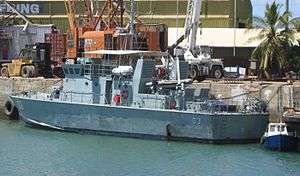HMPNGS Rabaul (P01)
HMPNGS Rabaul (01) was the first Pacific Forum patrol vessel to be commissioned, in May 1987.[1] She is not the first vessel to go out of service, because her sister ship from Fiji RFNS Kiro was wrecked in 2016. [2][3] She arrived in Port Moresby, for disposal, on October 24, 2018.
 HMPNGS Seeadler, a sister ship | |
| History | |
|---|---|
| Name: | Rabaul |
| Operator: | Papua New-Guinea Defence Force |
| Launched: | 1987 |
| Decommissioned: | August 2018 |
| Fate: | Scrapped |
| General characteristics | |
| Class and type: | Pacific Forum-class patrol boat |
| Displacement: | 162 tons |
| Length: | 103 feet (31 m) |
Originally she sailed under the name HMPNGS Tarangau.[5]
Australia gave Papua New Guinea four vessels, and gave an additional eighteen vessels to neighboring countries in the Pacific Forum.[5][6] Australia gave these vessels to her smaller neighbors after the United Nations Convention of the Laws of the Sea established that maritime nations had 200 kilometres (120 mi) Exclusive Economic Zone.[7] Australia gave these vessels so its neighbours could police their own sovereignty.
Design
Australia designed the vessels using commercial off-the-shelf technology, so small countries would find them easier to maintain, in small remote shipyards. Australia fully equipped the ships, prior to delivery, with the exception of providing armament, but they are capable of mounting an autocannon on the foredeck.
Replacement
Australia started building a new, larger, and more capable class of patrol vessels, to replace the Pacific Forum class.[1][7] Rabaul was replaced by HMPNGS Ted Diro, in December 2018.
Operational history
Rabaul and her sister ships played a role in the Bouganville conflict.[6]
References
-
"Papua New Guinean patrol boat HMPNGS Rabaul completes final mission". Naval Technology. 2018-10-24. Archived from the original on 2018-10-24. Retrieved 2018-10-24.
The vessel sailed for the last time from Lombrum Naval Base on Manus Island to Port Macquarie in New South Wales, Australia, where it is due to undergo environmentally responsible disposal.
-
"Fiji navy patrol vessel RFNS Kiro grounded at Cakauyawa Reef". Maritime Herald. 2016-07-19. Archived from the original on 2018-06-12. Retrieved 2018-06-11.
The Fiji navy patrol vessel RFNS Kiro grounded at Cakauyawa Reef on 6 nautical miles off Makuluva Island, Suva.
-
Arieta Vakasukawaqa (2016-08-03). "Kiro Grounding Probe Completed". Fiji Sun. Archived from the original on 2018-06-12. Retrieved 2018-06-11.
He said works to salvage the RFNS Kiro would be an expensive operation for the Fiji Navy.
-
"Semaphore: February 2005". Semaphore magazine. February 2005. Archived from the original on 2018-10-25. Retrieved 2018-10-24.
The governments of a number of the Pacific island nations expressed their concern about the need for a suitable maritime patrol force to fulfil their new surveillance requirements. The Australian government responded by instituting a Defence Cooperation Project (DCP), to provide suitable patrol vessels and associated training and infrastructure to island nations in the region. The Pacific Patrol Boat Systems Program Office was created within the Minor War Vessels Branch of the Royal Australian Navy (RAN) procurement organisation to manage the DCP[2] and to be the Project Authority.
-
Marcus Boomen (2017). "The Prospects of Developing War Crimes Databasing Projects: A Case Study of the Bougainville Conflict" (PDF). Canterbury University. Archived (PDF) from the original on 2018-02-16. Retrieved 2018-10-24.
The Papua New Guinea Defence Force – This is the military of PNGDF and identifies all uniformed soldiers as well as the naval and air assets. Their air force contains Australian-supplied UH-1 Iroquois helicopters, Pacific class patrol boats 1-4 HMPNGS Rabaul, Dreger, Seeadler and Moresby as well as Nomad light aircraft.
-
Joanne Wallis (2018-10-20). "Australia steps up its Pacific pivot". East Asia Forum. Archived from the original on 2018-10-25. Retrieved 2018-10-24.
A particularly well received aspect of the Defence Cooperation Program is the Pacific Patrol Boat Program. While the program has faced challenges in the past, these have been outweighed by its benefits, both to recipient states and Australia. Australia was right to build on the existing program with the Pacific Maritime Security Program, which will see new boats supplied to the region as well as a commitment to provide personnel and sustainment over 30 years.